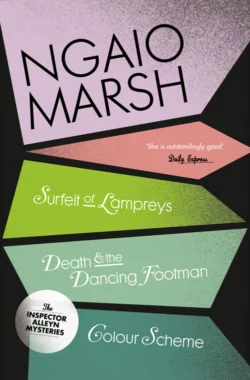Inspector Alleyn 3-Book Collection 4: A Surfeit of Lampreys, Death and the Dancing Footman, Colour Scheme

Ngaio Marsh
Тип: электронная книга
Жанр: Современная зарубежная литература
Язык: на английском языке
Стоимость: 1957.59 ₽
Статус: В продаже
Издательство: HarperCollins
Дата публикации: 16.04.2024
Отзывы: Пока нет Добавить отзыв
О книге: Commemorating 75 years since the Empress of Crime’s first book, the fourth volume in a set of omnibus editions presenting the complete run of 32 Inspector Alleyn mysteriesSURFEIT OF LAMPREYSThe Lampreys were a peculiar family. They entertained their guests with charades – like rich Uncle Gabriel, who was always such a bore. The Lampreys thought if they jollied him up he would bail them out of poverty again. But Uncle Gabriel meets a violent end, and Chief Inspector Alleyn had to work out which of them killed him…DEATH AND THE DANCING FOOTMANIt begins as an entertainment: eight people, many of them adversaries, gathered for a winter weekend by a host with a love for theatre. It ends in snowbound disaster. Everyone has an alibi – and a motive as well. But Roderick Alleyn soon realizes that it all hangs on Thomas, the dancing footman…COLOUR SCHEMEIt was a horrible death -lured into a pool of boiling mud and left to die. Roderick Alleyn, far from home on a wartime quest for enemy agents, knows that any number of people could have killed him: the English exiles he′d hated, the New Zealanders he′d despised, or the Maoris he′d insulted. Even the spies he′d thwarted…